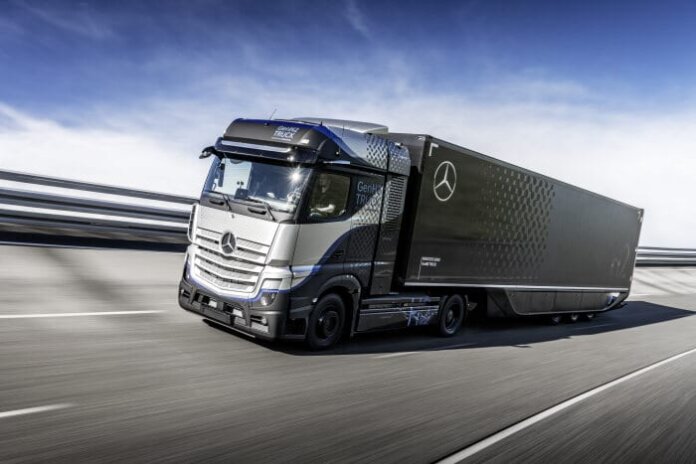Daimler Trucks says it is conducting tests on the new prototype of its Mercedes-Benz GenH2 Truck, which was unveiled in 2020. The tests are focusing on continuous operation, different weather and road conditions, and various driving maneuvers.
The company aims to achieve ranges of up to 1,000 kilometers without any stops for refueling. According to Daimler Trucks’ development plan, the vehicle will also be tested on public roads before the end of the year. Customer trials are scheduled to begin in 2023. The first series-produced GenH2 Trucks are expected to be handed over to customers starting in 2027.
“We are consistently pursuing our technology strategy for the electrification of our trucks,” says Martin Daum, chairman of the board of management at Daimler Truck AG. “We want to offer our customers the best locally CO2-neutral trucks – powered by either batteries or hydrogen-based fuel-cells, depending on the use case. We’re right on schedule and I’m delighted that the rigorous tests of the GenH2 Truck have started successfully.”
The development engineers at Daimler Trucks are designing the GenH2 Truck so that the vehicle and its components meet the same durability requirements as a comparable conventional Mercedes-Benz Actros. This means 1.2 million kilometers on the road over a period of 10 years and a total of 25,000 hours of operation. During the first few weeks of testing, the vehicle has already covered hundreds of kilometers under continuous load on a road-to-rig test stand and gone through many extreme situations that are based on real-life operating conditions.
The GenH2 Truck has been newly designed from the ground up. It features completely new components including the fuel-cell system, the all-electric powertrain and all of the associated systems such as the special cooling unit. In addition, the new components’ specific weight and position in the vehicle affect the truck’s handling properties. As a result, the vibrations caused by bumpy roads and extreme situations subject the fuel cell truck to different forces than those in conventional vehicles. In order to obtain extensive information about this at an early stage, the current prototype is loaded during the tests with a payload of up to 25 tons for a gross vehicle weight of about 40 tons, which is identical to the specifications planned for the series-produced variant of the GenH2 Truck.
By the end of the year, Daimler engineers plan to have the new prototype tank system sufficiently mature to be used to continue the ongoing tests of the GenH2 Truck. The vehicle tests will then be conducted exclusively with liquid hydrogen tank systems until the series-production stage is reached. Until this can be done, the extensive internal testing of the GenH2 Truck will use a gaseous hydrogen tank system as an interim solution. Daimler Trucks is thus demonstrating that both variants – gaseous and liquid – can be technically implemented.




